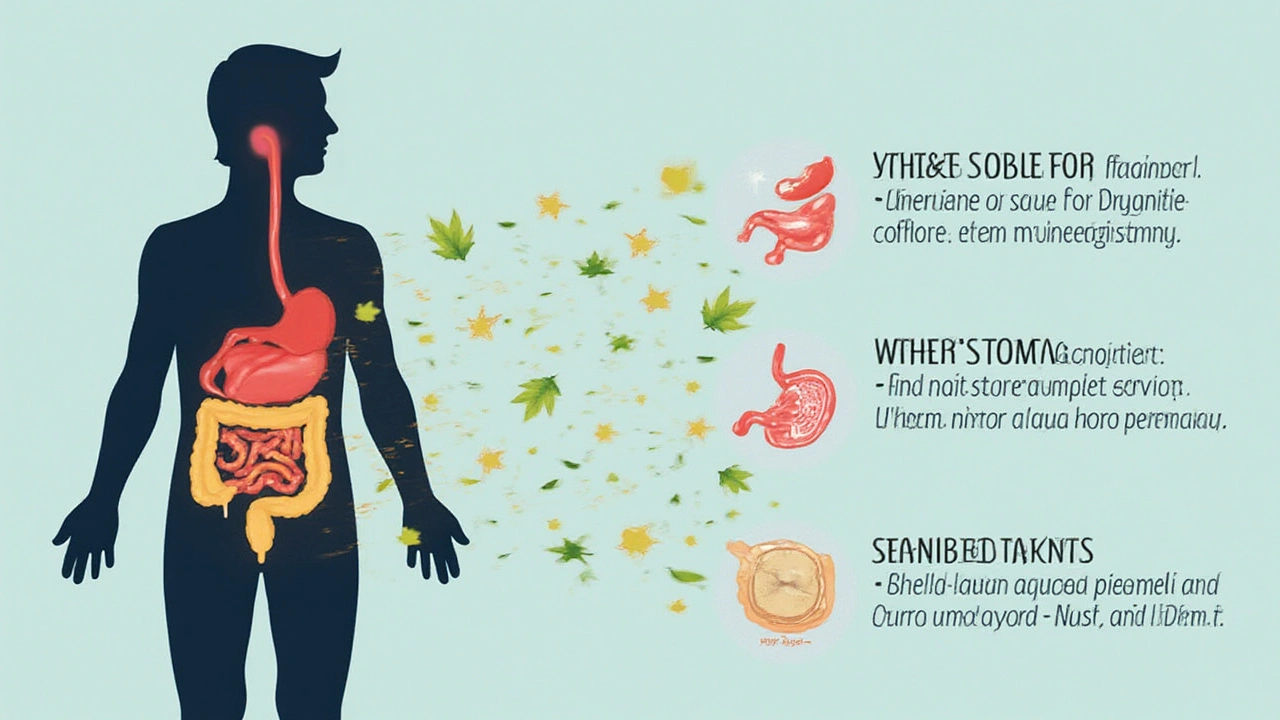Picture this: you’ve tried every herbal tea in the aisle, downed probiotics, maybe even switched up your pet’s food (Biscuit, my dog, still judges my choices), and yet that stubborn bloating or nagging gut discomfort lingers. Here’s something most folks don’t know—an unassuming wood from the tropics, called quassia, has quietly gathered a solid science fan base for its effects on digestion and much more. If you’ve ever rolled your eyes at so-called “miracle herbs,” stick around. Quassia might actually deserve the hype, and there’s data to back it up.
Digestive Support: Bitter Power in Action
Quassia comes from the wood of the Quassia amara or Picrasma excelsa trees, found mainly in South America and the Caribbean. What’s cool is that the wood contains quassinoids—compounds proven to be among nature's most bitter substances. And bitter isn’t just a flavor; it’s a trigger. Strong research shows that when you taste bitter compounds, your digestive system wakes up. Your salivary glands and stomach jumpstart, producing more digestive juices, which means food breaks down easier and faster. This matters a ton if you’re struggling with sluggish digestion, recurring heaviness after meals, or just a sense that your system isn’t clearing things out the way it should.
One of the quassinoids, quassin, is so potent that just one part per two million of water tastes distinctly bitter. Studies as recent as 2023 in the "Journal of Ethnopharmacology" document that quassia extracts help stimulate gastric secretions and bile, making it easier to digest fats and proteins. This leads to less bloating, smoother elimination, and for many, fewer nasty burps after a big meal. Folk medicine caught onto this centuries ago—traditional healers brewed quassia teas for stomachaches long before randomized trials confirmed the effect.
Quassia’s appetite-boosting effects are also notable. In clinical trials, patients with poor appetite due to illness or stress who took quassia extract enjoyed a measurable increase in meal intake compared to placebo. The digestive perks aren't just placebo magic or wishful thinking: split trials with control groups have shown statistically significant benefits to those who take it regularly in modest doses.
But don’t just toss any bitter wood chips into your tea. Modern supplement makers use precise extracts, often measured for quassinoid content, to ensure safety and effectiveness. Your average herbalist or nutritionist might suggest quassia bitters as a gentle pre-meal tonic—just a few drops in water can get things moving in the right direction. For those with persistent digestive sluggishness, such as older folks or anyone whose system needs an extra nudge, quassia might be the quiet champion you haven’t tried yet.
Antiparasitic Effects: Science versus Stubborn Bugs
Beyond digestion, here’s the second act: quassia’s resume as a natural antiparasitic. Back before chemical dewormers, indigenous healers steeped quassia as a remedy for gut bugs. Fast-forward to lab studies, and the story gets even more interesting. Quassia extracts have been tested against a variety of parasites, especially protozoa and intestinal worms. For example, research published in 2022 in "Parasitology Research" found that quassia extracts inhibited the development of Giardia lamblia and eliminated the larvae of Ascaris lumbricoides (roundworm) in controlled environments.
German veterinary trials observed that livestock given quassia extracts had fewer instances of parasitic infection compared to untreated groups. And it’s not just in animals—several small, double-blind studies on humans noted improvements in parasitic clearance, particularly in regions where intestinal worms plague public health. What’s responsible? Again, quassinoids—a family of bitter compounds. They’re toxic to worms and other undesirable critters but generally safe for us at recommended doses.
Unlike harsh pharmaceuticals, quassia does its work with less risk of gut irritation. That’s a huge plus for people sensitive to conventional antiparasitics. For travelers heading to regions with unreliable tap water, incorporating quassia tea or extracts could offer some extra backup. Real talk, though: you still need basic hygiene. Quassia isn’t a substitute for washing your hands or drinking filtered water. But for those searching for a gentle, herbal addition to parasite control routines, it’s hard to ignore the Quassia benefits that new studies are confirming.
Here’s a look at some numbers pulled from published trials:
| Parasite | Reduction Rate | Study Year | Notes |
|---|---|---|---|
| Giardia lamblia | 85% | 2022 | In vitro; quassia extract |
| Ascaris lumbricoides | 75% | 2019 | Human/pediatric study |
| Strongyloides stercoralis | 83% | 2021 | Cattle; veterinary research |
One tip: always source your quassia from reputable suppliers since dosing is important and wild harvesting can deplete local forests. Sustainability matters, not just for the Amazon, but for the people and animals who rely on these traditional medicines.

Dosage Guidelines: Getting it Right and Staying Safe
Let’s get real—a little is good, too much is not better. The secret with quassia is precise dosing. Clinical and herbal guidelines usually agree that doses between 120 mg and 500 mg of dried quassia bark per day are safe for adults. If you’re thinking about using a tincture, the standard is around 1–2 ml before meals, but always dilute in water. For quassia tea, most recommendations put it at 1–2 teaspoons of wood shavings per cup, steeped for 10–15 minutes, up to twice daily.
Children require extra caution. Most pediatric studies stick to lower doses, around 60–120 mg per day, and always with a doctor’s sign-off. Pregnant or breastfeeding people should skip quassia since safety data is limited and some animal studies hint at possible uterine contractions. Puppies like Biscuit? Also a no-go—veterinary antiparasitic doses are different and must be tailored by an expert.
One neat trick if you can’t stand the taste: mix the dose in a bit of apple juice. I tried that once, and even Biscuit looked intrigued. But don’t push past your palate; the bitterness is a hint you’ve had enough.
It’s worth knowing that long-term, high-dose quassia can irritate the lining of your gut. Side effects are rare at recommended amounts, but in some people, nausea or stomach upset can sneak in at higher doses. When in doubt, less is more. And definitely tell your pharmacist if you’re adding quassia to your daily routine—bitter compounds in large amounts could interfere with how your body processes other medications.
Here’s a helpful summary in list form:
- Adults: 120–500 mg dried bark, 1–2 ml tincture, or one cup tea before meals (max twice daily)
- Children: 60–120 mg dried bark—doctor’s guidance necessary
- Pregnancy/Breastfeeding: Avoid
- Pets: Use only with vet direction for specific cases
- Avoid exceeding daily max for more than 2 weeks straight
How to Make the Most of Quassia: Tips, Stories, and Real-World Use
If you’re game to try quassia, here’s how to make it work for your lifestyle. Start with a single daily dose as a tea or tincture about 20 minutes before your largest meal. If you’re taking quassia for digestive sluggishness, you may notice a reduced heavy feeling within a week. If you’re looking for antiparasitic benefits (say, after a camping trip where you may have drunk from a stream), follow dosing mentioned above for 7–14 days but always stop if you feel any stomach irritation.
Many people combine quassia with other bitters—think gentian, dandelion root, or artichoke leaf—to create a “bitters blend” that covers all bases. Bitters are having a moment, showing up in fancy craft cocktails and even alcohol-free “mocktail” bars, but for real digestive benefits, you want zero sugar added and a solid, standardized extract.
I tried drying a small chunk in the oven once. Spoiler: my kitchen smelled like a science lab, and Biscuit refused to nap within 10 feet of it. Lesson: buy the extract, skip the messy DIY. The upside? Controlled dosing, cleaner flavor, and less risk of overdoing it.
Watch out for cheap imitations or “wild-crafted” claims without real certification. Ethical brands will use sustainable sources and provide concentration details on the label. Mixing quassia with food doesn’t ruin the effect—a tablespoon of the tea can perk up a stew or even drizzle into a salad dressing (if you really like bitter flavors).
One interesting twist: several modern European digestion aids still use quassia as a main ingredient, decades after synthetic drugs took over. It’s not just an old wives’ tale—there’s a reason this tree hasn’t faded from herbal formulas.
If you’re sensitive to bitter flavors, start slow and pair your dose with a small snack. Some people even find making a batch of quassia ice cubes adds a cool twist—drop one into a glass of sparkling water right before dinner. It’s a far cry from trendy detox cleanses and delivers solid results without weird side effects.
When friends ask about herbal options for travel or post-antibiotic stomach funk, quassia is always on my short list. This bitter bark is cheap, packs well, and works quickly—just respect its strength and you’ll likely find it’s worth adding to your herbal arsenal.
No supplement is a silver bullet, but sometimes a barely-noticed tree from the jungle offers a nudge where modern approaches fall flat. Keep quassia in mind next time your gut or travels need backup—and double-check your doses, even Biscuit would approve of keeping things safe and steady.



kuldeep singh sandhu
July 18, 2025 AT 01:08Honestly, I don’t see why everyone is suddenly hyping quassia like it’s some miracle cure for digestion and parasites.
Sure, there are studies, but they often seem limited or based on small samples, so how much can we really trust the benefits?
Plus, doses are hard to standardize with natural products, meaning you might get a different effect each time.
I’d argue there are plenty of other herbs with a longer proven record that do the same or better.
Still, if it works for you, great, but personally, I wouldn’t swap my proven remedies just based on hype.
Anyone else skeptical about this, or am I just being too cynical?
Jackie Berry
July 19, 2025 AT 02:08I get where you're coming from, but I think quassia’s appeal is partly because it’s natural and backed by some solid research.
From what I've read, it seems pretty effective in stimulating digestion without harsh side effects, which is a big plus in my opinion.
Also, it’s used traditionally in a lot of cultures, so it has a history beyond just recent studies.
Regarding dosing, like with any herbal supplement, it does require some careful attention, but that’s true for most natural remedies.
It's great if people are cautious, but it doesn't hurt to explore and maybe incorporate such options to complement conventional medicine.
Nicola Strand
July 20, 2025 AT 08:41Actually, I find it increasingly irresponsible to promote substances like quassia without a comprehensive understanding of the risks involved.
Just because something is 'natural' or 'traditionally used' does not guarantee safety or efficacy.
Parasite control is a serious medical issue, and relying on herbs instead of proper medication could be harmful.
It is vital that users rely on vetted, modern healthcare solutions rather than romanticizing herbal quick fixes.
We require more rigorous trials and regulatory oversight before endorsing them widely.
Jackie Zheng
July 20, 2025 AT 10:26I can't help but notice the flurry of misinformation swirling around herbs like quassia.
It's crucial to get your facts straight: Quassia's bitter principles can indeed stimulate digestion but overuse might cause unpleasant side effects.
Also, people frequently misuse dosing instructions, failing to consider individual tolerance or interactions.
One must remember the pharmacodynamics as well as the historical context.
Anyone sharing tips, please stick to scientifically vetted information.
Mariah Dietzler
July 21, 2025 AT 14:13Well, I gotta say, I skimmed the post but didn’t dive deep into all the research links.
Seems like quassia might be helpful, but I’m kinda lazy to try it out or verify super thoroughly 😅
If it’s natural and has some evidence, cool, but not jumping on this bandwagon anytime soon.
Anyone using this regularly? Would love to hear some easy-to-follow tips or warnings, if any.
Mikayla May
July 22, 2025 AT 18:00From a practical standpoint, quassia can be a useful adjunct for some digestive issues, especially bitter herbs which help stimulate bile flow.
However, I’d recommend caution with parasite control: herbal treatments can vary widely in effectiveness and aren’t always documented well.
So if someone suspects a parasite infection, getting a proper diagnosis and medical advice is critical.
For daily digestive support, brewed quassia in low, controlled doses might aid, but overdoing it could irritate the stomach lining.
Always consult a healthcare professional before adding new herbal remedies to your routine.
Hariom Godhani
July 23, 2025 AT 21:46It's honestly surprising how many folks here underestimate the importance of proven herbal knowledge banks like quassia.
This plant isn't some new fad; it holds a reputable place in traditional medicine spanning centuries.
The bitterness that many complain about is precisely what triggers digestive secretions and fights parasites effectively.
Turning one’s back on this in favor of purely synthetic, big-pharma-manufactured solutions feels like handcuffing ourselves to expensive pharmaceuticals unnecessarily.
That said, understanding and respecting dosage is non-negotiable to avoid harm.
Natural does not mean careless; it means informed use coupled with respect for nature’s power.
Robert Hunter
July 25, 2025 AT 01:33Coming from a cultural perspective, I appreciate seeing traditional remedies like quassia gaining some recognition backed by science.
However, it’s critical that as we adopt these remedies, we also embrace responsible usage with clear guidance on dosing and potential risks.
Moreover, it’s important to educate consumers on distinguishing between anecdotal evidence and rigorous research.
Ultimately, integrating these approaches can enrich our health toolkit but with balanced caution.
Shruti Agrawal
July 25, 2025 AT 15:26Hey, I've personally tried quassia for mild digestive discomfort, and I must say it did help ease things up, though I was careful about dosage.
I brewed a tea with the bark and noticed less bloating and better appetite after a few days.
But I wouldn't claim it cures everything or replace medical treatment if the issue is serious.
Just wanted to share my experience so folks here getting curious have a data point.
Also, it's low cost and accessible in many regions, which is great for natural health enthusiasts.
Katey Nelson
August 12, 2025 AT 14:00Omg, does anyone else think about how these natural remedies make us connect back to earth? 🌿 Quassia is like this ancient whisper of wisdom, you know?
It’s so wild how something so bitter can calm our tummies and kick out pesky parasites.
Sometimes I wonder if we’re way too quick to pop pills without appreciating these plant gifts.
But also, gotta be careful, right? No one wants to mess with their health over the wrong dose. 😬
Would love to hear how others integrate quassia into their routines or if anyone feels skeptical.
Let's keep the chat going! 😊
Joery van Druten
August 16, 2025 AT 01:20While all the perspectives here are interesting, I feel compelled to add that scientific rigor cannot be overlooked when discussing herbal remedies like quassia.
Many plants contain bioactive constituents that can have powerful effects, both beneficial and adverse.
Anyone considering quassia should be aware of possible interactions with other medications and the variability in product quality.
Clinical trials should be prioritized for confirmation rather than relying on anecdotal evidence alone.
That said, responsibly integrated complementary approaches can indeed have a place in helping digestion and parasite control.